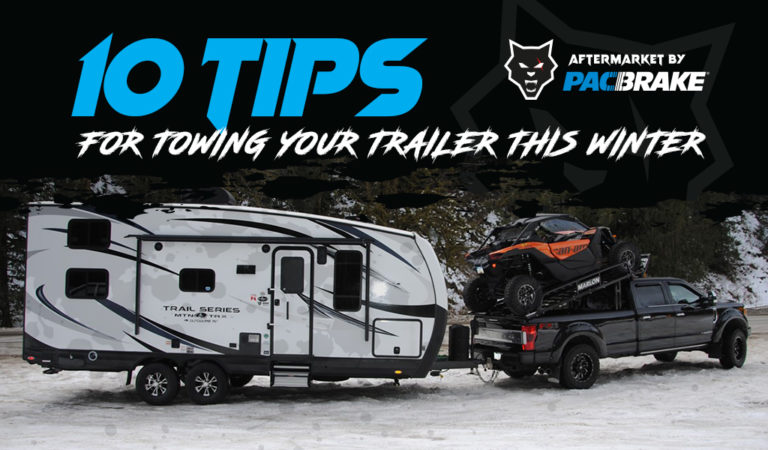On the road, surrounded by snow capped mountains, a long playlist of songs and some hot chocolate in your thermos. Is that your idea of a long winter drive?
Winter drives can be lovely and scenic—until they suddenly become totally terrifying. You need to remember that winter driving requires its own set of precautions: the more majestic the conditions, often the more dangerous the road can be. this is specially true when navigating unfamiliar routes or towing with the trailer with that ATV. With slippery roads, heavy snow smacking the windshield, you and your trailer need to be prepared for dangerous situations. Check out these tips from our towing experts.
1. Have the Proper Towing Equipment
AIR SUSPENSION
Using bolt-on friction sway control products can actually be a hindrance during winter driving as this equipment makes it harder to get control of the trailer on icy roads. You should have the proper weight distribution equipment, plus air springs, air bags, or air suspension springs as they are commonly called. An air suspension helps keep the ride smooth, but also helps keep your trailer in control.
EXHAUST BRAKES
If you are driving in the mountains you should consider the use of an exhaust brake. Exhaust brakes use exhaust pressure from the diesel engine to help brake your vehicle, which means there’s less wear and tear on your truck’s brakes. Because the braking is more gentle, you’ll mitigate trailer sway.
2. Know Your Vehicle
Driving a new rig setup in the summer is bad enough while you get used to it. During the winter, take a test run or two on less populated roads to learn how the rig will behave. If possible, take a test drive in the snow.
3. Keep Your Trailer and Truck Maintained
Maintenance goes a long way in keeping you safe. Before you leave for a trip, check the suspension, tires and brakes on the truck and trailer, and the steering and fluids on the truck, and make sure the accessories on both vehicles are working properly.
4. Keep Extra Gear in the Truck
If you were to lose your trailer, you wouldn’t have any survival gear. Be sure to keep extra survival gear, including blankets, first aid kit, food, water, matches, a tinder kit, and a tarp – at the minimum – in the truck.
5. Watch the Speed Limits
Speed limits tell you how safe it is to go a certain speed in good conditions. When it’s snowy or cold enough to freeze everything, conditions are not ideal. Watch your speed, especially on roads you do not know. If people get impatient, you can let them go around you.
6. Keep a Safe Distance
Towing a heavy load means it will take longer for you to stop. Instead of the standard distance between you and the vehicle in front of you, keep at least 10 car lengths between your truck and the vehicle in front of you. If the vehicle in front of you brakes hard, you’ll have more time to brake without jackknifing your trailer.
7. Passing Safely
Unless someone in front of you is going super slow, like a tractor trailer up a steep mountain, you should try not to pass in inclement weather. If you do have to pass, make sure you do it safely and that you do not impede traffic in the passing lane. It’s better to go slower and get to your destination safe rather than not at all – or with a dented truck and trailer.
8. Climbing
People are often tempted to overload their truck and trailer. Make sure you know how much your truck can handle, and how much weight your trailer can handle. While an overweight truck and trailer spells bad news in any conditions, it’s even more troubling when climbing. If you’re headed to the mountains, be sure you are not towing more than your truck can handle, and that your truck’s cargo isn’t over the weight limit.
9. Driving in Slippery Conditions
You already know to go slow in slippery conditions. Slow and steady. Don’t turn the wheel fast, and don’t brake fast. When going up hills, the last thing you want to do is stop. You need the right momentum going up the hill, but not so much that it’s fast enough to make you spin out. And whatever you do – don’t stop on the hill. If you don’t trust the person in front of you to make it up, wait until they crest the hill before you work your way up. Let the momentum carry you up, then keep your foot even on the gas. Slow and steady.
10. Check the Weather
Before you leave, check the weather for the distance you will travel for the day. If it looks like it might be too bad you might consider staying where you are until the weather blows over.
Want to learn more about air suspension and exhaust brakes for your tow vehicle or want to purchase quality exhaust brake and air suspension systems? You can call Pacbrake at 1-800-663-0096 or search for a dealer near you on our Find a Dealer page.


